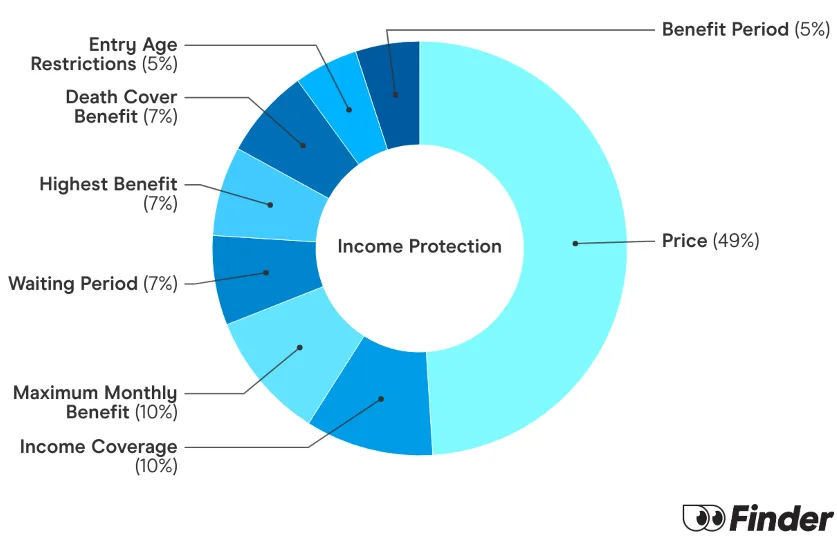Compare other products
We currently don't have that product, but here are others to consider:
How we picked theseFinder Score - Income Protection
Income Protection is a little complicated and a lot overwhelming. That's why we made the Finder Score, to make it easier to compare Life Insurance products against each other. Our experts analysed over 12 products and gave each one a score rank out of 10.
But a higher score doesn't always mean a product is better for you. Your situation is unique, so your policy choice will be too. Don't think of Finder Score as the final word, but as a good place to start your life insurance comparison.
As a self-employed worker, there is little support for you to fall back on if you are seriously injured. Personal accident insurance offers protection to ensure you still receive an income if an injury happens.
- Can provide a lump sum. Cover for accidental death, injury or disability.
- Options to cover sickness. You can tailor your policy to cover both personal accident and illness or just accidents only
- No medical exams. Coverage can usually be put in place without having to undertake any medical or blood tests.
Speak to an insurance specialist to help you find personalised cover
What does personal accident insurance cover?
Personal accident insurance is a type of cover that provides financial protection in the event that you are injured from an accident. Personal Accident insurance gives you peace of mind 24 hours a day, seven days a week, anywhere in the world, by providing you with cover from insured events. Personal accident insurance insured events include:
- Death & Total Disablement
- Disablement
- Fracture
Why is it important to consider personal accident insurance if you're self employed?
When you are self employed, you are not eligible for workers compensation.
Government bodies highly recommend that you take out cover for accident and sickness through a private insurer to provide financial compensation in the event of revenue loss while you are unable to work (business.gov.au, 2013).
Furthermore, most injuries and accidents occur outside of work and with no appropriate cover in place, you are leaving yourself and your business at risk financially.
Five key benefits of taking out personal accident cover
Of course, none of us want to find ourselves the victim of an accident or succumbing to an illness but no matter how healthy or safe you think you are, the chances of this happening at some point during your self employed career are very real. There are many benefits to taking out personal accident illness insurance for self employed people. Some of these benefits are as follows:
- Provision of financial safety net for self employed workers: Self employed workers do not enjoy the same benefits from employers offered to other workers such as sick pay, holiday leave, leave for maternity or long service. Apart from the basic benefits provided from Centrelink, a self-employed worker does not have any other financial safety net in place should they become injured and are unable to keep working. In the event that their business were to stop running because of a serious injury, they could loose existing clients, be unable to cover their business overheads and have no stream of income to cover bills and other living expenses.
- Peace of mind: As a self employed person in the current economic climate, things can be very unpredictable in terms of work and income. The last thing you want is to add to the problem by failing to protect your finances in the event that you cannot work and earn due to sickness or injury. With these plans in place you will at least have the peace of mind that if debilitating illness or injury stops you from working you will not be left high and dry financially.
- Choice of plans: You will find a great choice of personal accident illness insurance self employed plans available from a number of providers, which means that you can boost the chances of finding the right plan for your needs whilst also staying within your maximum budget.
- The ability to choose how you want your benefit: The benefit that is paid out in the event of a claim may be paid out in different ways, so by choosing the right plan you can dictate whether you want the benefit as a lump sum payment or whether you want to take it as a number of periodic payments.
- Avoiding unnecessary financial troubles: If you were unable to work due to sickness or injury, and you had no protection in place, you would really suffer financially, as you would have no way – other than dipping into any savings you might have – to pay the bills, rent or mortgages, food bills, clothing and education costs, and other essential costs that you have to deal with. Having this protective cover in place means that even though you cannot avoid accidents and illness you can avoid the terrible financial repercussions that can stem from them.
How is Personal Accident Insurance Different to Income Protection?
While income protection will offer a benefit payment for both illness and injuries, accident insurance will only offer a benefit payment if the policyholder suffers an injury as the result of an accident and is unable to work. You read finder's full income protection guide here.
| Details | Personal accident | Income protection |
|---|---|---|
| What events are covered? | Injuries | Injuries and illnesses |
| How am I paid out? | Lump sum payment or income replacement | Income replacement |
In what situations would I consider personal accident cover?
Personal accident insurance can be a good option for workers that have struggled to find a suitable insurance option in the past as a result of a pre-existing medical condition or the nature of their occupation. Compared to income protection, there is generally no medical underwriting required as pre-existing illness are not relevant to accidents.
What personal accident features should self employed workers look out for?
When you are self employed, you have to take out insurance cover that would otherwise have been covered by your employer, such as income protection and personal accident insurance. While, both these types of insurance protect your ability to keep earning despite of your disability and inability to work in your own right, there are some key features that you want to look out for personal accident insurance:
- Premiums are tax-deductible: When you're in business for yourself an important aspect of everything you do is based around lowering your taxation at the end of each financial year and personal accident insurance can help you do this as the premium you pay for the cover is tax-deductible.
- A lump sum benefit amount if you become permanently disabled: If you are seriously injured and become permanently disabled, you are entitled to receive a lump sum amount. However, this will affect the tax treatment of your premiums.
- Benefit period: Applicants must assess what a suitable benefit period is for their situation. Generally, you can apply for a benefit period of up to 52 weeks.
- Waiting period: The amount of time that the injured policyholder must be unable to work in order to receive a benefit payment, generally after 30 day excess period.
- Policy exclusions:
- Benefit payment is usually only provided for injuries that have been caused directly by an accident.
- Injuries should be externally visible and if necessary, will be verified by a medical practitioner.
- Accident policies will generally not cover the policyholders for any illnesses, dental injuries and injuries that have been caused by self-infliction or attempted suicide.
- The injury will usually have to be within 60 days from the date the policyholder stopped work.
More guides on Finder
-
Accident and sickness insurance for the self-employed
If you're self-employed, then you should consider accident and sickness insurance. It can protect you in the event that a serious injury prevents you from working.
-
Sports Insurance in Australia – how personal accident insurance works
If you play sports or lead an active life then consider personal accident insurance. You can compare cover from Australian insurers here too.

